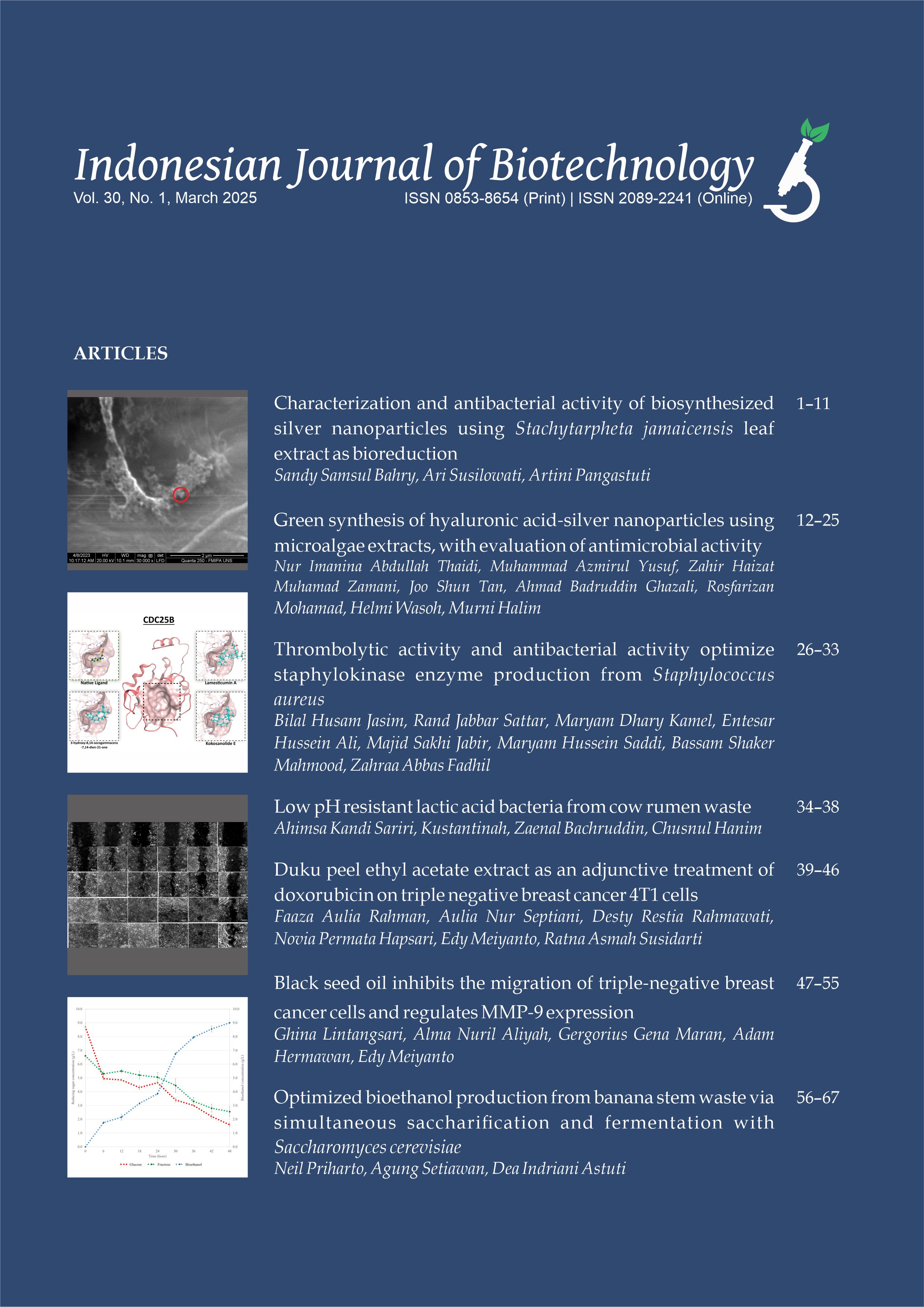Identification of Pediococcus Strains Isolated from Feces of Indonesian Infants With in vitro Capability to Consume Prebiotic Inulin and to Adhere on Mucus
W. Widodo(1*), Nosa Septiana Anindita(2), Tiyas Tono Taufiq(3), Tutik Dwi Wahyuningsih(4)
(1)
(2)
(3)
(4)
(*) Corresponding Author
Abstract
The aim of this experiment was to identify isolates obtained from feces of Indonesian infants and to evaluate their capability as probiotics. Identification of isolates was carried out based on morphology, physiology and biochemical identifications, and molecular identification based on 16S rRNA sequence. Morphological and physiological identification was carried out based on Gram staining, shape, motility, spore formation and catalase production. Biochemical identifications based on production of CO2 and NH3 from glucose, the ability to grow on different temperature (10 and 45°C) and pH (4.4 and 9.6), and different salt concentration (6.5 and 18%). Probiotics capability of isolates was assayed on the ability to grow on low pH (pH 2.0), on different bile salts concentration (0.3; 0.5; 1.0 and 1.5%), the capacity to grow on media with inulin as the only carbon source, and in vitro adhesion ability on porcine mucin. Morphological, physiological and biochemical identification suggest that all of isolates belong to lactic acid bacteria. Further molecular identification of five isolates showed
that isolates AA, BE and BK were strains of Pediococcus acidilactici (similarity 99%), while isolate AP and AG were strains of Lactobacillus casei (similarity 99-100%). Probiotic assays showed that more than 80% of cells of Pediococcus acidilactici isolates AA, BE and BK were viable after grown on pH 2.0 for 90 min, and around 80% of cells from the same isolates were survived on media supplemented with bile salt 1.5% for 2 h. All of isolates had high adhesion capacity as seen by more than 75% of cells attached on pig gastric mucin. Investigation
of isolates to grow on inulin showed Pediococcus acidilactici isolate BE was able to consume inulin as the only carbon source. It is concluded that Pediococcus acidilactici isolate BE was a candidate probiotics and subject to further in vivo evaluation using animal models to examine their beneficial health effects.
Key word : Pediococcus acidilactici, Lactobacillus casei, human origin and probiotics.
that isolates AA, BE and BK were strains of Pediococcus acidilactici (similarity 99%), while isolate AP and AG were strains of Lactobacillus casei (similarity 99-100%). Probiotic assays showed that more than 80% of cells of Pediococcus acidilactici isolates AA, BE and BK were viable after grown on pH 2.0 for 90 min, and around 80% of cells from the same isolates were survived on media supplemented with bile salt 1.5% for 2 h. All of isolates had high adhesion capacity as seen by more than 75% of cells attached on pig gastric mucin. Investigation
of isolates to grow on inulin showed Pediococcus acidilactici isolate BE was able to consume inulin as the only carbon source. It is concluded that Pediococcus acidilactici isolate BE was a candidate probiotics and subject to further in vivo evaluation using animal models to examine their beneficial health effects.
Key word : Pediococcus acidilactici, Lactobacillus casei, human origin and probiotics.
Full Text:
PDFArticle Metrics
Refbacks
- There are currently no refbacks.
Copyright (c) 2015 Indonesian Journal of Biotechnology









